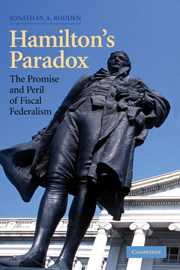Book contents
- Frontmatter
- Contents
- Preface
- Acknowledgments
- 1 INTRODUCTION AND OVERVIEW
- 2 PROMISE AND PERIL: INTELLECTUAL HISTORY
- 3 SOVEREIGNTY AND COMMITMENT
- 4 THE POWER OF THE PURSE: INTERGOVERNMENTAL GRANTS AND FISCAL DISCIPLINE
- 5 DISEASE OR CURE? POLITICAL PARTIES AND FISCAL DISCIPLINE
- 6 AN APPROACH TO COMPARATIVE CASE STUDIES
- 7 FISCAL FEDERALISM AND BAILOUTS IN POSTWAR GERMANY
- 8 THE CRISIS OF FISCAL FEDERALISM IN BRAZIL
- 9 THE CHALLENGE OF REFORM IN FEDERATIONS
- 10 THE ORIGINS OF SUBNATIONAL SOVEREIGNTY
- 11 CONCLUSIONS
- References
- Index
- Titles in the series
2 - PROMISE AND PERIL: INTELLECTUAL HISTORY
Published online by Cambridge University Press: 14 January 2010
- Frontmatter
- Contents
- Preface
- Acknowledgments
- 1 INTRODUCTION AND OVERVIEW
- 2 PROMISE AND PERIL: INTELLECTUAL HISTORY
- 3 SOVEREIGNTY AND COMMITMENT
- 4 THE POWER OF THE PURSE: INTERGOVERNMENTAL GRANTS AND FISCAL DISCIPLINE
- 5 DISEASE OR CURE? POLITICAL PARTIES AND FISCAL DISCIPLINE
- 6 AN APPROACH TO COMPARATIVE CASE STUDIES
- 7 FISCAL FEDERALISM AND BAILOUTS IN POSTWAR GERMANY
- 8 THE CRISIS OF FISCAL FEDERALISM IN BRAZIL
- 9 THE CHALLENGE OF REFORM IN FEDERATIONS
- 10 THE ORIGINS OF SUBNATIONAL SOVEREIGNTY
- 11 CONCLUSIONS
- References
- Index
- Titles in the series
Summary
This book asks a very specific question: Under what conditions do the actions of state and local governments strengthen or undermine the overall fiscal discipline of government? Yet the question is posed with an eye on older and larger questions about the relationship between decentralization, federalism, and the efficiency and accountability of government. Thus, it is useful to situate current debates about fiscal discipline within a larger current of intellectual history that runs through the classics of political philosophy to modern public economics. Moreover, an important first step in doing theoretical and empirical work on this topic is to cut through the array of definitions and measurements of decentralization and federalism used in diverse literatures and settle on some concepts that will be used throughout the book. In doing so, this chapter also serves to highlight the ways in which the approach taken in this book departs from previous studies.
After introducing in broad terms the classic themes that motivate modern research, this chapter reviews the contributions of welfare economics and public choice theory to the notion that federalism and decentralization can enhance the efficiency and accountability of government. It pays special attention to theories suggesting that decentralization, especially in the context of federalism, can enhance overall fiscal discipline. Next, these abstract arguments are confronted with attempts to define decentralization and federalism with more precision and pin them down with cross-country empirical measures.
- Type
- Chapter
- Information
- Hamilton's ParadoxThe Promise and Peril of Fiscal Federalism, pp. 15 - 47Publisher: Cambridge University PressPrint publication year: 2005



